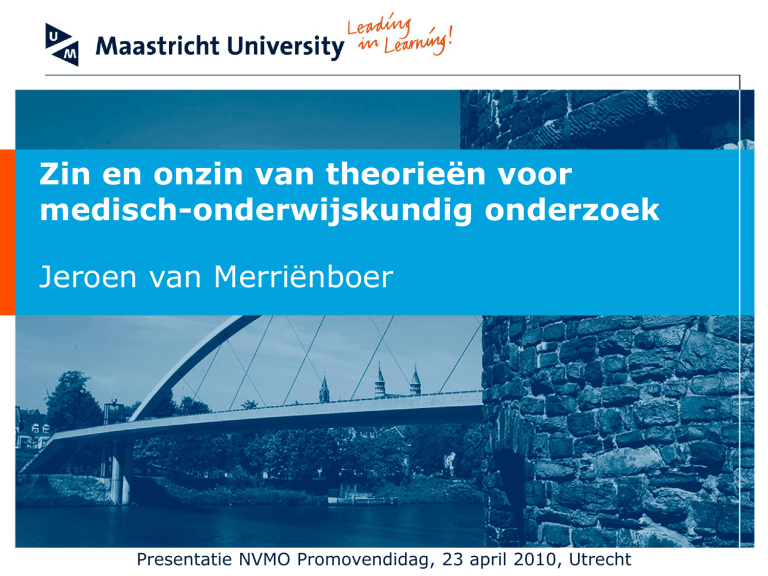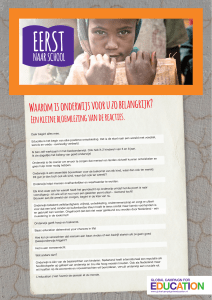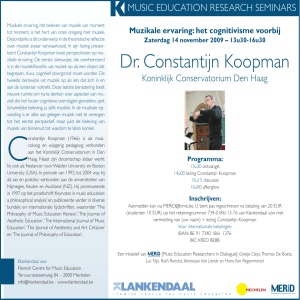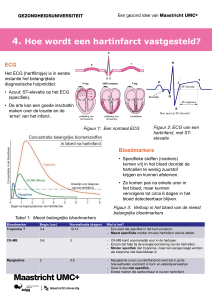
Zin en onzin van theorieën voor
medisch-onderwijskundig onderzoek
Jeroen van Merriënboer
Presentatie NVMO Promovendidag, 23 april 2010, Utrecht
FHML – Dept. of Educational Development and Research – School of Health Professions Education
Basisvragen
• Theorieën
– Hoe leren mensen?
– Welke factoren beïnvloeden leren?
– Wat zijn implicaties voor onderwijs?
• Paradigma’s
– Hoe beïnvloeden paradigma’s theorieën?
– Wat betekent dit allemaal voor medischonderwijskundig onderzoek?
FHML – Dept. of Educational Development and Research – School of Health Professions Education
Mensen leren door…..
•
•
•
•
•
•
•
•
•
•
•
•
•
voorbeelden te bestuderen
te doen
te luisteren
boeken te lezen
beloond te worden
te ontdekken
te vergelijken
te exploreren
te contrasteren
te voorspellen en testen
ondervraagd te worden
trial-and-error
presentaties te geven
•
•
•
•
•
•
•
•
•
•
•
•
•
te discussiëren
te abstraheren
aantekeningen te maken
te observeren
uitleg te geven
informatie te reorganiseren
problemen op te lossen
analogieën te vinden
informatie te analyseren
informatie te parafraseren
herhaling
vragen te stellen
en heel, heel veel andere...
FHML – Dept. of Educational Development and Research – School of Health Professions Education
Welke factoren beïnvloeden leren?
1. Gewenste uitkomsten of doelen
–
Wat je wilt bereiken bepaalt de manier waarop je
leert
2. Condities waaronder geleerd wordt
–
Die dingen die niet gemanipuleerd worden maar
gegeven zijn
3. Onderwijs-methoden
–
Die dingen die wel gemanipuleerd kunnen worden
en bepaalde soorten leren faciliteren
FHML – Dept. of Educational Development and Research – School of Health Professions Education
Taxonomie van uitkomsten Ia
• Intellectuele vaardigheden
– Gebruik concepten en regels om problemen op te lossen
• Cognitieve strategieën
– Initiëren van nieuwe oplossingen voor problemen
• Verbale informatie
– Benoemen van informatie
• Attitudes/houdingen
– Kiezen om je op een bepaalde manier te gedragen
• Perceptueel-motorische vaardigheden
– vloeiend uitvoeren van zintuiglijke en motorische acties
FHML – Dept. of Educational Development and Research – School of Health Professions Education
Intellectuele vaardigheden - Ib
• Hogere-orde regels
– genereren van nieuwe regels om een probleem op te lossen
• Regels
– demonstreer de toepassing van een regel/procedure
• Gedefinieerde concepten
– in staat zijn om objecten te classificeren
• Concrete concepten
– aanwijzen van voorbeelden van objecten
• Discriminatie
– dingen van elkaar onderscheiden
FHML – Dept. of Educational Development and Research – School of Health Professions Education
Taxonomie van Bloom II
FHML – Dept. of Educational Development and Research – School of Health Professions Education
Condities of omstandigheden
Leggen beperkingen op aan mogelijke soorten leren
Context
Doelgroep
Taak / Domein
cultuur
setting
(school, militair,
bedrijf, overheid)
tijd
geld
beschikbare
apparatuur
etc.
opleidingsnivo
voorkennis
misconcepties
leeftijd
handicaps
sexe
Leerstijlen
levensfase
etc.
organisatie
(conceptueel,
structureel,
causaal)
complexiteit
gereedschappen
standaarden
gevaren
etc.
FHML – Dept. of Educational Development and Research – School of Health Professions Education
Onderwijsmethoden
• Dingen die in de omgeving gemanipuleerd
kunnen worden
• “Ubiquity of interactions”
– Er zijn geen methoden die wel of niet werken
(hoezo evidence-based education?)
– Sommige methoden werken onder bepaalde
condities voor bepaalde uitkomsten
– Theorie: relateert methoden, condities en
uitkomsten aan elkaar
FHML – Dept. of Educational Development and Research – School of Health Professions Education
Theorieën en Paradigma’s
Condities
doelgroep
context
taak & domein
gewenste
uitkomsten
soort leren
onderwijsmethoden
FHML – Dept. of Educational Development and Research – School of Health Professions Education
1. Gestaltbenadering
• 1910-1940
• Duitsland (Wertheimer, Koffka,
Kohler etc.) en Engeland (Bartlett’s
meaning theory)
• Focus op probleemoplossen en de
“flash of insight”
• Re-organisatie and re-constructie
The most important factor influencing learning
is insight and understanding. Teaching should
be directed towards reaching this goal.
FHML – Dept. of Educational Development and Research – School of Health Professions Education
2. (Neo)behaviorisme
• 1920-1965
• Vooral in de VS (Thorndike,
Skinner, Tolman etc.)
• Focus op leren door beloning
en straf (“reinforcement”)
• Operante conditionering,
“programmed learning”
The most important factor influencing learning is
reinforcement: reward of desired behaviors (and
punishment of undesired behaviors).
FHML – Dept. of Educational Development and Research – School of Health Professions Education
3. Ontwikkelingsbenadering
• 1930-nu
• Zeer sterk beïnvloed door het werk van Jean
Piaget (Zwitserland, †1980)
• Focus op cognitieve ontwikkeling
–
–
–
–
sensori-motorische stadium (0-2 jaar)
pre-operationale stadium (2-7 jaar)
concreet-operationele stadium (7-12 jaar)
Formeel-operationele stadium (12-)
The most important factor influencing
learning is the learner’s stage of
cognitive development. Teaching should
be at the right level.
FHML – Dept. of Educational Development and Research – School of Health Professions Education
4. Dialectisch Materialisme
• 1940-nu
• Wortels in Sovjet Unie
(Vygotski, Galpjerin,
Utrechtse school van Van
Parreren etc.)
• Focus op internaliseren van
interacties met de wereld.
Past in een socialistisch
perspectief
• Activity Theory (Engestrom)
is nu weer erg populair
The most important
factor influencing
learning is (social)
interaction with the
world. Vygotski: “the
mind grows through
interaction with other
minds”.
FHML – Dept. of Educational Development and Research – School of Health Professions Education
5. Informatieverwerkingsbenadering
• 1950-1975
• VS , Europa (Broadbent, Neisser, Craick)
• Het menselijk brein als informatie-verwerker (“mind
as computer”)
• Focus op verschillende soorten informatieverwerking
(encoding, storage, retrieval)
• Mentale activiteit
The most important factor
influencing learning is the type of
information processing. Active
processing of information is the key
to learning
FHML – Dept. of Educational Development and Research – School of Health Professions Education
6. Cognitief-psychologische
symbolische modellen
• 1970-nu
• Ausubel, Newell,
Simon, J. R. Anderson,
van Merriënboer e.v.a
• Focus op symbolische
cognitieve
Ausubel: “the most important
representaties, leren
single factor influencing learning
is what the learner already
als interpreteren
knows. Ascertain this and teach
him accordingly.
FHML – Dept. of Educational Development and Research – School of Health Professions Education
Four-component instructional design
FHML – Dept. of Educational Development and Research – School of Health Professions Education
7. Cognitief-psychologische resource
modellen
• 1970-nu
• Miller (7 plus or minus 2),
Baddeley, Kahneman,
Sweller & van Merriënboer
• Focus op beperkte
capaciteit en recources van
het menselijk brein
• (long-term) working
memory
The most important
factor influencing learning
is the limited processing
capacity of the human
mind.
FHML – Dept. of Educational Development and Research – School of Health Professions Education
Cognitieve Belastingstheorie
FHML – Dept. of Educational Development and Research – School of Health Professions Education
8. Sociaal-constructivisme
• Populaire benadering in de
jaren 1990-nu
• Von Glasersfeld, Jonassen,
Duffy, Wladzawick, Bednar..
• Combineert perspectieven
uit:
– Gestalt (probleemoplossen en
inzicht)
– Dialectiek (sociale interactie)
– Cognitieve psychologie (bouw op
voorkennis)
The most important factor
influencing learning is the
construction of meaning.
This is an active and social
process building on what the
learner already knows.
FHML – Dept. of Educational Development and Research – School of Health Professions Education
“Decade by findings interactions”
•
•
•
•
•
•
•
•
inzicht en begrip
sociale interactie
reinforcement
ontwikkelingsstadium
mentale activiteit
voorkennis
gelimiteerde capaciteit
betekenisgeving
• Paradigma’s bepalen
waar theorieën “naar
kijken”, en daarmee
ook de resultaten
FHML – Dept. of Educational Development and Research – School of Health Professions Education
Wat betekent dit voor
medisch-onderwijskundig
onderzoek?
• Een onderzoeker zonder theorie is een
dolende in de woestijn
• Een onderzoeker met één theorie heeft
oogkleppen op en komt niet veel verder
• Een onderzoeker die gebruik maakt en
bijdraagt aan voor hem/haar relevante
theorieën draagt een steentje bij aan de
hardest science of all…
FHML – Dept. of Educational Development and Research – School of Health Professions Education
Discussie en Vragen
FHML – Dept. of Educational Development and Research – School of Health Professions Education












